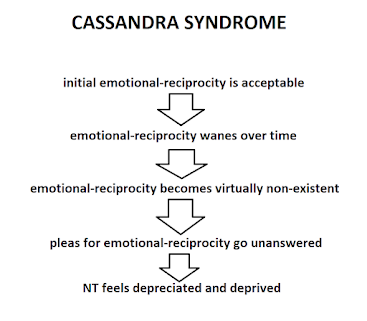💛 When It’s Not Narcissism: Understanding ASD Blind Spots in Your Marriage
Your husband’s emotional blind spots may feel personal — but they’re neurological, not narcissistic. Here’s how to tell the difference.
If you’re a neurotypical (NT) wife married to a husband on
the autism spectrum, you’ve probably felt moments of deep confusion — even hurt
— when his behavior seems cold, indifferent, or self-focused.
You might find yourself wondering:
“Is this autism… or narcissism?”
Let’s slow that fear down.
Because in the majority of neurodiverse marriages, what looks like narcissism
is actually neurological blind spots, not character flaws.
🌫️ Why ASD Can Look Like
Narcissism (But Isn’t)
Many NT wives describe experiences like:
- “He
doesn’t ask how I feel.”
- “He
forgets to check on me.”
- “He
shuts down when I try to talk.”
- “He
doesn’t notice when I’m hurting.”
- “He
walks away in the middle of emotional moments.”
These behaviors feel narcissistic because narcissism
also involves a lack of empathy, emotional unavailability, and self-focus.
But here’s the crucial difference:
👉
Autistic blind spots are neurological.
Narcissistic behaviors are psychological.
Let’s break that down simply.
🧠 ASD Blind Spots Come
From Neurology
Autistic husbands may experience:
Difficulty intuitively reading emotions, intentions, or
“unspoken messages.”
This isn’t apathy — it’s missing data.
If the information isn’t explicit, the autistic brain may not register it.
He may need more time to understand what he’s feeling — or
what you’re feeling.
He isn’t ignoring you.
He’s decoding.
Intense concentration on one thing at a time. Your emotional
cues aren’t dismissed; they’re simply drowned out by the task at hand.
If he’s overwhelmed, his brain shifts into survival mode.
The capacity for emotional engagement temporarily shuts down.
5. Fear of Getting It Wrong
Many ASD husbands care deeply but feel insecure about
emotional conversations — so they retreat, not because they don’t care, but
because they’re afraid to fail.
💔 Narcissism, on the
Other Hand…
Narcissism involves:
- Lack
of remorse
- Manipulation
- Cruelty
or intentional harm
- Entitlement
- Grandiosity
- Exploiting
others for personal gain
- Punishing
you when you’re upset
Autistic men typically do none of these.
Most ASD husbands want:
✅
Harmony
✅
Predictability
✅
Partnership
✅
Stability
✅
To avoid hurting their spouse
They may fail to show empathy, but they usually feel
it deeply — even if it’s buried beneath overload, confusion, or shutdown.
🌟 What Feels Personal…
Usually Isn’t
You might think:
“He knows this hurts me — why does he keep doing it?”
But autistic blind spots are not intentional.
They’re more like missing puzzle pieces.
Your husband may:
- care
deeply
- love
you sincerely
- want
connection
- feel
terrible when you’re upset
- try
hard internally
- not
know how to express any of it externally
He isn’t withholding love.
He’s struggling to translate it.
💘 How NT Wives Can
Protect Their Hearts — Without Misjudging Their Husbands
Here are practical ways to support connection without
mistaking neurology for narcissism:
1. Replace Assumption With Clarification
Instead of thinking,
“He doesn’t care about my feelings,”
try asking:
“Can you tell me what you understood from what I just said?”
Often, he missed the emotional cue entirely — not because he
wanted to, but because it wasn’t explicit.
2. Be Direct, Not Hinted
ASD husbands do better with clarity:
“I feel lonely. Can you sit with me for 10 minutes?”
“I need a hug right now.”
“Can you check in on me this evening?”
Clear requests protect you both.
3. Avoid Interpreting Shutdowns as Rejection
Shutdown = overwhelm.
It’s not:
- punishment
- withdrawal
of love
- silent
treatment
It’s the brain’s emergency brake.
Let him reset, then reconnect later.
4. Notice Effort, Not Style
He may express love through:
- fixing
things
- solving
problems
- showing
up
- loyalty
- routine
- small
acts of service
These are love languages — even if different from your own.
5. Work Together on Emotional Translation Tools
Try:
- shared
scripts
- feelings
charts
- debrief
times
- “pause
phrases”
- connection
rituals
These tools create safety and reduce misfires.
6. Don’t Diagnose Your Marriage Alone
Loneliness + confusion can distort perception.
Talking with a therapist or coach who understands neurodiversity prevents
misinterpretation.
You deserve support — and clarity.
💛 A Reassuring Truth
Most NT wives married to ASD husbands are not with
narcissists.
They are with good men who love deeply but differently.
Men who:
- don’t
intend harm
- aren’t
playing emotional games
- aren’t
punishing you
- aren’t
indifferent
- aren’t
manipulative
They simply have blind spots that can be worked with,
softened, and bridged.
Compassion + structure builds connection.
Clarity + safety rebuild trust.
And neurodiverse couples can create beautiful marriages when they
understand each other's wiring.
💬 From My Coaching
Practice
I help NT wives and ASD husbands understand each other’s
emotional languages — turning confusion into clarity and loneliness into
connection.
If you’re struggling with this dynamic, you’re not alone —
and you’re not imagining things.
A supportive, structured approach can bring relief quickly.
==> Cassandra Syndrome Recovery for NT Wives <==
 |
| Mark Hutten, M.A. |
Pick Your Preferred Day/Time
Available Classes with Mark Hutten, M.A.:
==> Cassandra Syndrome Recovery for NT Wives <==
==> Online Workshop for Men with ASD level 1 <==
==> Online Workshop for NT Wives <==
==> Online Workshop for Couples Affected by Autism Spectrum Disorder <==
==> ASD Men's MasterClass: Social-Skills Emotional-Literacy Development <==
Individual Zoom Call:
==> Life-Coaching for Individuals with ASD <==
Downloadable Programs:
==> eBook and Audio Instruction for Neurodiverse Couples <==
